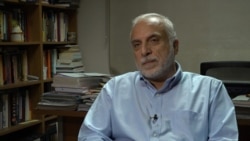Turkish President Recep Tayyip Erdogan's plan to return up to 2 million refugees to Syria is increasingly in question. With refugees carving out a new life for themselves in Turkey, many may be reluctant to return, while rights groups warn of forced deportations.
Mandy restaurant in Istanbul's Aksaray district has been serving locals for more than six years.
"We will not return to Syria," said Mandy owner Isam Abdi.
Abdi left Syria at the start of the civil war. Arriving in Istanbul, speaking little Turkish and having no contacts, he managed to build a successful business. He now owns two restaurants, his children are in college, and he sees only Turkey offering him a future.
"Because of the war, (it's) not safe there," he said of his Syrian homeland. "They say in Damascus it is safe. But (there) is no electric, no gas, no nothing. ... It is easier to live here. And as I said, we established a new life from zero here, and now we are going good. I can't leave here and go and establish a new life there."
While Istanbul has been good for Abdi, he acknowledges that for other Syrians, it is a different story.
"There are some people who want to go back (to Syria)," Abdi said. "Circumstances are not good here. They can't find a job. They are in debt."
Turkey currently hosts more than 3.5 million Syrian refugees who fled the war.
The refugees are expected to return to what Ankara calls a safe haven — an area in Syria where Turkish forces took control in an operation against a Kurdish militia.
Significant obstacles
Analysts warn that Ankara's plan faces significant obstacles diplomatically and from the refugees themselves.
"I don't see any reason why (Syrian President) Bashar al-Assad will want any of those refugees back," said Soli Ozel, an international relations lecturer at Istanbul's Kadir Has University. "And he certainly will not take most of them back. I just don't see it."
"We (Turkey) are stuck. We might as well admit it and then try to actually take care of those things, unless we put them in trucks and dump them on the other side of the border, which I doubt we'll be able to do," Ozel said.
In a report released in October, Amnesty International accused Turkey of forcibly deporting refugees back to Syria.
"It is likely that hundreds of people across Turkey were swept up, detained and transported against their will to one of the world's most dangerous countries," the report said.
In a separate finding last week, a U.S.-based Human Rights Report claimed Turkish authorities arbitrarily detained and deported dozens of Syrians to northern Syria between January and September.
"The claims in the report about Syrians being forcibly sent back, threatened and mistreated are false and imaginary," Turkish Foreign Ministry spokesman Hami Aksoy said.
WATCH: Many Refugees Want to Stay
Syrian refugees
Ankara said more than 350,000 Syrian refugees have voluntarily returned to their country, as police in Istanbul have begun rounding up refugees without proper documentation.
"I said I have my ID, but I forgot it at home," Amjad said, recalling his detainment by an Istanbul police officer. To protect his identify, Amjad only used his first name.
"I said, 'If you can wait for 5, 10 minutes, my family will bring the ID,' " he added. "He ... waited 2 minutes, but then they sent me directly to the Tuzla (suburban Istanbul) police precinct and then to Syria. ... I am from Damascus, not from Idlib. But they sent me to Idlib."
Amjad managed to return to Turkey after his family proved to authorities he had the correct identification.
Erdogan is facing increasing domestic pressure to reduce the refugee presence, which he knows could pose a challenge to his power. According to opinion polls, public discontent is growing. Those feelings, analysts warn, are being aggravated by a slowing economy and rising unemployment.
Ankara insists that all Syrian repatriations will be voluntary, in compliance with international law.
Ali, who is identified by his first name by request, is taking advantage of the free education offered to Syrians by Turkey. He is about to start college after completing his Turkish courses.
A college degree enables him to secure the prized official documentation he needs to remain in Istanbul. Like many Syrian refugees, he still plans for a future in Turkey.
"I need to continue my studies in the university and graduate," he said. "After that, I need ... experience in business management. (A) future in Turkey is better than a future in Syria. So, I need to stay here for maybe 10 years, 15 years."









